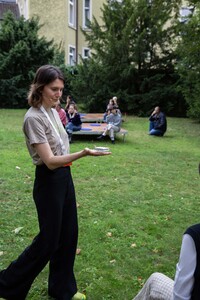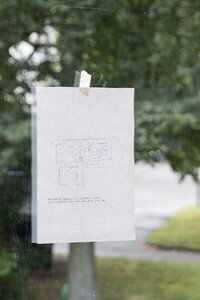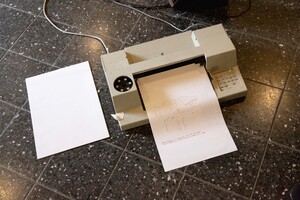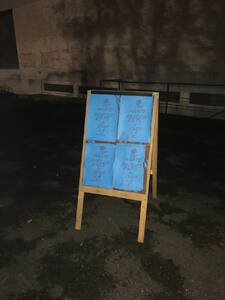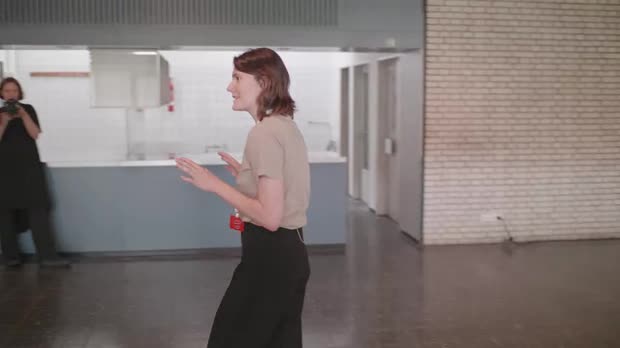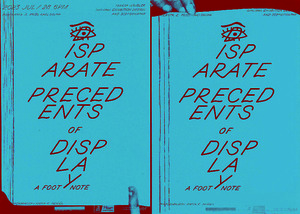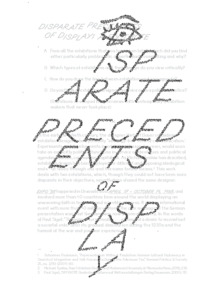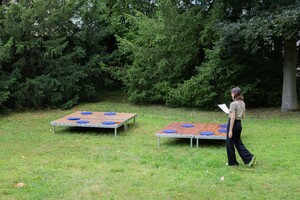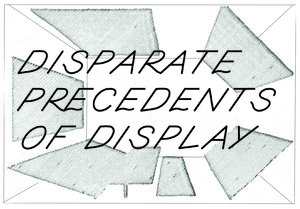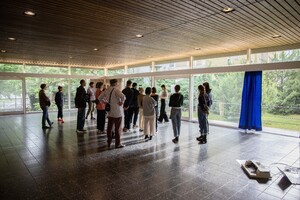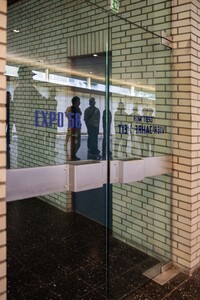Werk
Alle Inhalte mit Metadaten des Vokabulars "Werk". Sie sehen nur Inhalte, für die Sie berechtigt sind.
1969 Inhalte
- Seite 1 von 165
Disparate Precedents of Display
- Titel
- Disparate Precedents of Display
- Titel (en)
- Disparate Precedents of Display
- Untertitel
- A Footnote
- Untertitel des Projekts/Werks (en)
- A Footnote
- Autor/in
- Beschreibung (de)
- Das Projekt befasst sich mit den politischen Dimensionen der Ausstellungsgestaltung und führt durch zwei vom Architekten Egon Eiermann gestaltete Ausstellungen. Es erforscht die Verschränkung von Design und Politik, Nationalsozialismus und Formen der Repräsentation.
"Disparate Precedents of Display" untersucht die Art und Weise, wie der Raum auf die Besucher wirkt, und stellt Ausstellungsdesign als eine genuin politische Praxis dar, die auf der Vergangenheit aufbaut und von ihr erbt - von vergangenen Ausstellungen, einflussreichen Ausstellungsgestalter*innen und Konventionen der Präsentation, die in unterschiedlichen politischen Systemen wurzeln.
Zwei Ausstellungen, die vom deutschen Staat in Auftrag gegeben wurden, dienen als Fallstudien. "Gebt mir vier Jahre Zeit" war eine nationalsozialistische Propagandaschau, die 1937 in Berlin stattfand. Sie feierte die Umgestaltung aller Bereiche der Gesellschaft unter der nationalsozialistischen Herrschaft seit der Umsetzung von Adolf Hitlers Vierjahresplan. Einundzwanzig Jahre später beauftragte die Bundesrepublik Deutschland denselben Architekten mit der Gestaltung des deutschen Pavillons auf der Expo '58 in Brüssel. Auf der Weltausstellung hatte der junge Nachfolgestaat zum ersten Mal die Gelegenheit, die kulturellen, wirtschaftlichen und politischen Parameter des nunmehr demokratischen Deutschlands auf internationaler Ebene zu präsentieren. Beide Ausstellungen lassen sich als Repräsentationen staatlicher Macht und politischer Narrative beschreiben - die eine im Namen des Krieges, die andere im Namen der Humanität. Maßgeblich beteiligt an beiden Ausstellungen war Egon Eiermann als Ausstellungsarchitekt.
Performance: Anna K. Seidel
Outside Eye: Caroline Kapp, Manon Haase
Graphikdesign: Mona Mayer
Single line font EE_7475: Barbara Acevedo Strange, Moritz Appich
Coding: Frank Bublitz
Stimme: Liv Rahel Schwenk
Aufzeichnung: Florian Wulff
Video Dokumentation: Mustafa Emin Büyükcoşkun
Photographien: Lizzy Ellbrück
Editorial support: Joyce Moore
Copyediting: George MacBeth
Special Thanks to
Céline Condorelli, Hanne König, Sami Khatib, Lioudmila Voropai,
Julian Warner, Thomas Rustemeyer, Constanze Fischbeck,
Susanne Kriemann, Hans D. Christ und Iris Dressler, Judith Milz,
Christian Becker (Stadtarchiv Oranienburg), Mechthild Ebert (saai),
Janina Capelle, Lydia Kähny, Daniel Lythgoe, Tjark Schönfeld,
Alexander Knoppik, Lena Breitmoser, Sören Göbel, Jule Köpke, Arthur Schuman,
Jana Barthel and Danny Klein.
Gefördert von
Fonds Darstellende Künste (Rechercheförderung)
Rosa Luxemburg Stiftung Baden Württemberg
- Das Projekt befasst sich mit den politischen Dimensionen der Ausstellungsgestaltung und führt durch zwei vom Architekten Egon Eiermann gestaltete Ausstellungen. Es erforscht die Verschränkung von Design und Politik, Nationalsozialismus und Formen der Repräsentation.
- Beschreibung (en)
- The project addresses the political dimensions of exhibition design, leading through
two exhibitions designed by architect Egon Eiermann. It explores the entanglement of
design and politics, National Socialism and forms of representation.
"Disparate Precedents of Display" looks at the way space affects visitors, exposing exhibition design as a genuinely political practice, building on and inheriting from the past – from past exhibitions, influential exhibition designers and conventions of display rooted in disparate political systems.
Two exhibitions, commissioned by the German state, serve as case studies. “Gebt mir vier Jahre Zeit” was a National Socialist propaganda show staged in Berlin in 1937. It celebrated the transformation of all sectors of society under National Socialist rule since the implementation of Adolf Hitlers 4-year-plan. Twenty-one years later, the Federal Republic of Germany commissioned the same architect to design the German Pavilion at the Expo ‘58 in Brussels. At the World‘s Fair the young successor state had its first opportunity to present the cultural, economic and political parameters of a now democratic Germany on an international scale. Both shows can be described as representations of state power and political narratives – one in the name of war and one in the name of humanity. Significant contributor to both exhibitions was Egon Eiermann in his role as exhibition architect.
Performance: Anna K. Seidel
Outside Eye: Caroline Kapp, Manon Haase
Graphic Design: Mona Mayer
Single line font EE_7475: Barbara Acevedo Strange, Moritz Appich
Coding: Frank Bublitz
Voice: Liv Rahel Schwenk
Recording: Florian Wulff
Video documentation: Mustafa Emin Büyükcoşkun
Photography: Lizzy Ellbrück
Editorial support: Joyce Moore
Copyediting: George MacBeth
Special Thanks to
Céline Condorelli, Hanne König, Sami Khatib, Lioudmila Voropai,
Julian Warner, Thomas Rustemeyer, Constanze Fischbeck,
Susanne Kriemann, Hans D. Christ und Iris Dressler, Judith Milz,
Christian Becker (Stadtarchiv Oranienburg), Mechthild Ebert (saai),
Janina Capelle, Lydia Kähny, Daniel Lythgoe, Tjark Schönfeld,
Alexander Knoppik, Lena Breitmoser, Sören Göbel, Jule Köpke, Arthur Schuman,
Jana Barthel and Danny Klein.
Funded by
Fonds Darstellende Künste (Rechercheförderung)
Rosa Luxemburg Stiftung Baden Württemberg
- The project addresses the political dimensions of exhibition design, leading through
- Typ des Projekts/Werks
- Schlagworte
- Datierung
- 28.07.2023
- Mitwirkende
- Dank an
- Sprache
- Dauer
- Performance: ca. 30 Minuten
- Ort
- Brauerstraße 2
- Stadt
- Land
- Titel
- Disparate Precedents of Display
- Urheberrechtshinweis
- Teresa Häußler
- Rechtsschutz/Lizenz
- Freigabe Nutzung HfG
- Medienersteller/in
- Beziehung/Funktion
- Medien-Beschreibung (en)
- Anna K. Seidel presenting a 3D printed model of the German Pavilion at Expo '58 to the audience
- Abgebildete Personen
- Projektleiter/in
- Semester
- Studiengang
- Typ der Abschlussarbeit
- Importiert am
- 28.09.2023
- Übergeordnete Sets
- 1
Disparate Precedents of Display
- Titel
- Disparate Precedents of Display
- Titel (en)
- Disparate Precedents of Display
- Untertitel
- A Footnote
- Untertitel des Projekts/Werks (en)
- A Footnote
- Autor/in
- Beschreibung (de)
- Das Projekt befasst sich mit den politischen Dimensionen der Ausstellungsgestaltung und führt durch zwei vom Architekten Egon Eiermann gestaltete Ausstellungen. Es erforscht die Verschränkung von Design und Politik, Nationalsozialismus und Formen der Repräsentation.
"Disparate Precedents of Display" untersucht die Art und Weise, wie der Raum auf die Besucher wirkt, und stellt Ausstellungsdesign als eine genuin politische Praxis dar, die auf der Vergangenheit aufbaut und von ihr erbt - von vergangenen Ausstellungen, einflussreichen Ausstellungsgestalter*innen und Konventionen der Präsentation, die in unterschiedlichen politischen Systemen wurzeln.
Zwei Ausstellungen, die vom deutschen Staat in Auftrag gegeben wurden, dienen als Fallstudien. "Gebt mir vier Jahre Zeit" war eine nationalsozialistische Propagandaschau, die 1937 in Berlin stattfand. Sie feierte die Umgestaltung aller Bereiche der Gesellschaft unter der nationalsozialistischen Herrschaft seit der Umsetzung von Adolf Hitlers Vierjahresplan. Einundzwanzig Jahre später beauftragte die Bundesrepublik Deutschland denselben Architekten mit der Gestaltung des deutschen Pavillons auf der Expo '58 in Brüssel. Auf der Weltausstellung hatte der junge Nachfolgestaat zum ersten Mal die Gelegenheit, die kulturellen, wirtschaftlichen und politischen Parameter des nunmehr demokratischen Deutschlands auf internationaler Ebene zu präsentieren. Beide Ausstellungen lassen sich als Repräsentationen staatlicher Macht und politischer Narrative beschreiben - die eine im Namen des Krieges, die andere im Namen der Humanität. Maßgeblich beteiligt an beiden Ausstellungen war Egon Eiermann als Ausstellungsarchitekt.
Performance: Anna K. Seidel
Outside Eye: Caroline Kapp, Manon Haase
Graphikdesign: Mona Mayer
Single line font EE_7475: Barbara Acevedo Strange, Moritz Appich
Coding: Frank Bublitz
Stimme: Liv Rahel Schwenk
Aufzeichnung: Florian Wulff
Video Dokumentation: Mustafa Emin Büyükcoşkun
Photographien: Lizzy Ellbrück
Editorial support: Joyce Moore
Copyediting: George MacBeth
Special Thanks to
Céline Condorelli, Hanne König, Sami Khatib, Lioudmila Voropai,
Julian Warner, Thomas Rustemeyer, Constanze Fischbeck,
Susanne Kriemann, Hans D. Christ und Iris Dressler, Judith Milz,
Christian Becker (Stadtarchiv Oranienburg), Mechthild Ebert (saai),
Janina Capelle, Lydia Kähny, Daniel Lythgoe, Tjark Schönfeld,
Alexander Knoppik, Lena Breitmoser, Sören Göbel, Jule Köpke, Arthur Schuman,
Jana Barthel and Danny Klein.
Gefördert von
Fonds Darstellende Künste (Rechercheförderung)
Rosa Luxemburg Stiftung Baden Württemberg
- Das Projekt befasst sich mit den politischen Dimensionen der Ausstellungsgestaltung und führt durch zwei vom Architekten Egon Eiermann gestaltete Ausstellungen. Es erforscht die Verschränkung von Design und Politik, Nationalsozialismus und Formen der Repräsentation.
- Beschreibung (en)
- The project addresses the political dimensions of exhibition design, leading through
two exhibitions designed by architect Egon Eiermann. It explores the entanglement of
design and politics, National Socialism and forms of representation.
"Disparate Precedents of Display" looks at the way space affects visitors, exposing exhibition design as a genuinely political practice, building on and inheriting from the past – from past exhibitions, influential exhibition designers and conventions of display rooted in disparate political systems.
Two exhibitions, commissioned by the German state, serve as case studies. “Gebt mir vier Jahre Zeit” was a National Socialist propaganda show staged in Berlin in 1937. It celebrated the transformation of all sectors of society under National Socialist rule since the implementation of Adolf Hitlers 4-year-plan. Twenty-one years later, the Federal Republic of Germany commissioned the same architect to design the German Pavilion at the Expo ‘58 in Brussels. At the World‘s Fair the young successor state had its first opportunity to present the cultural, economic and political parameters of a now democratic Germany on an international scale. Both shows can be described as representations of state power and political narratives – one in the name of war and one in the name of humanity. Significant contributor to both exhibitions was Egon Eiermann in his role as exhibition architect.
Performance: Anna K. Seidel
Outside Eye: Caroline Kapp, Manon Haase
Graphic Design: Mona Mayer
Single line font EE_7475: Barbara Acevedo Strange, Moritz Appich
Coding: Frank Bublitz
Voice: Liv Rahel Schwenk
Recording: Florian Wulff
Video documentation: Mustafa Emin Büyükcoşkun
Photography: Lizzy Ellbrück
Editorial support: Joyce Moore
Copyediting: George MacBeth
Special Thanks to
Céline Condorelli, Hanne König, Sami Khatib, Lioudmila Voropai,
Julian Warner, Thomas Rustemeyer, Constanze Fischbeck,
Susanne Kriemann, Hans D. Christ und Iris Dressler, Judith Milz,
Christian Becker (Stadtarchiv Oranienburg), Mechthild Ebert (saai),
Janina Capelle, Lydia Kähny, Daniel Lythgoe, Tjark Schönfeld,
Alexander Knoppik, Lena Breitmoser, Sören Göbel, Jule Köpke, Arthur Schuman,
Jana Barthel and Danny Klein.
Funded by
Fonds Darstellende Künste (Rechercheförderung)
Rosa Luxemburg Stiftung Baden Württemberg
- The project addresses the political dimensions of exhibition design, leading through
- Typ des Projekts/Werks
- Schlagworte
- Datierung
- 28.07.2023
- Mitwirkende
- Dank an
- Sprache
- Dauer
- Performance: ca. 30 Minuten
- Ort
- Brauerstraße 2
- Stadt
- Land
- Titel
- Disparate Precedents of Display
- Urheberrechtshinweis
- Teresa Häußler
- Rechtsschutz/Lizenz
- Freigabe Nutzung HfG
- Medienersteller/in
- Beziehung/Funktion
- Medien-Beschreibung
- Grundriss der Propagandaschau "Gebt mir vier Jahre Zeit", gedruckt mit einem Stiftplotter HP7475A
- Medien-Beschreibung (en)
- Floorplan of the propaganda show "Gebt mir vier Jahre Zeit", printed by a pen plotter HP7475A
- Projektleiter/in
- Semester
- Studiengang
- Typ der Abschlussarbeit
- Importiert am
- 28.09.2023
- Übergeordnete Sets
- 1
Disparate Precedents of Display
- Titel
- Disparate Precedents of Display
- Titel (en)
- Disparate Precedents of Display
- Untertitel
- A Footnote
- Untertitel des Projekts/Werks (en)
- A Footnote
- Autor/in
- Beschreibung (de)
- Das Projekt befasst sich mit den politischen Dimensionen der Ausstellungsgestaltung und führt durch zwei vom Architekten Egon Eiermann gestaltete Ausstellungen. Es erforscht die Verschränkung von Design und Politik, Nationalsozialismus und Formen der Repräsentation.
"Disparate Precedents of Display" untersucht die Art und Weise, wie der Raum auf die Besucher wirkt, und stellt Ausstellungsdesign als eine genuin politische Praxis dar, die auf der Vergangenheit aufbaut und von ihr erbt - von vergangenen Ausstellungen, einflussreichen Ausstellungsgestalter*innen und Konventionen der Präsentation, die in unterschiedlichen politischen Systemen wurzeln.
Zwei Ausstellungen, die vom deutschen Staat in Auftrag gegeben wurden, dienen als Fallstudien. "Gebt mir vier Jahre Zeit" war eine nationalsozialistische Propagandaschau, die 1937 in Berlin stattfand. Sie feierte die Umgestaltung aller Bereiche der Gesellschaft unter der nationalsozialistischen Herrschaft seit der Umsetzung von Adolf Hitlers Vierjahresplan. Einundzwanzig Jahre später beauftragte die Bundesrepublik Deutschland denselben Architekten mit der Gestaltung des deutschen Pavillons auf der Expo '58 in Brüssel. Auf der Weltausstellung hatte der junge Nachfolgestaat zum ersten Mal die Gelegenheit, die kulturellen, wirtschaftlichen und politischen Parameter des nunmehr demokratischen Deutschlands auf internationaler Ebene zu präsentieren. Beide Ausstellungen lassen sich als Repräsentationen staatlicher Macht und politischer Narrative beschreiben - die eine im Namen des Krieges, die andere im Namen der Humanität. Maßgeblich beteiligt an beiden Ausstellungen war Egon Eiermann als Ausstellungsarchitekt.
Performance: Anna K. Seidel
Outside Eye: Caroline Kapp, Manon Haase
Graphikdesign: Mona Mayer
Single line font EE_7475: Barbara Acevedo Strange, Moritz Appich
Coding: Frank Bublitz
Stimme: Liv Rahel Schwenk
Aufzeichnung: Florian Wulff
Video Dokumentation: Mustafa Emin Büyükcoşkun
Photographien: Lizzy Ellbrück
Editorial support: Joyce Moore
Copyediting: George MacBeth
Special Thanks to
Céline Condorelli, Hanne König, Sami Khatib, Lioudmila Voropai,
Julian Warner, Thomas Rustemeyer, Constanze Fischbeck,
Susanne Kriemann, Hans D. Christ und Iris Dressler, Judith Milz,
Christian Becker (Stadtarchiv Oranienburg), Mechthild Ebert (saai),
Janina Capelle, Lydia Kähny, Daniel Lythgoe, Tjark Schönfeld,
Alexander Knoppik, Lena Breitmoser, Sören Göbel, Jule Köpke, Arthur Schuman,
Jana Barthel and Danny Klein.
Gefördert von
Fonds Darstellende Künste (Rechercheförderung)
Rosa Luxemburg Stiftung Baden Württemberg
- Das Projekt befasst sich mit den politischen Dimensionen der Ausstellungsgestaltung und führt durch zwei vom Architekten Egon Eiermann gestaltete Ausstellungen. Es erforscht die Verschränkung von Design und Politik, Nationalsozialismus und Formen der Repräsentation.
- Beschreibung (en)
- The project addresses the political dimensions of exhibition design, leading through
two exhibitions designed by architect Egon Eiermann. It explores the entanglement of
design and politics, National Socialism and forms of representation.
"Disparate Precedents of Display" looks at the way space affects visitors, exposing exhibition design as a genuinely political practice, building on and inheriting from the past – from past exhibitions, influential exhibition designers and conventions of display rooted in disparate political systems.
Two exhibitions, commissioned by the German state, serve as case studies. “Gebt mir vier Jahre Zeit” was a National Socialist propaganda show staged in Berlin in 1937. It celebrated the transformation of all sectors of society under National Socialist rule since the implementation of Adolf Hitlers 4-year-plan. Twenty-one years later, the Federal Republic of Germany commissioned the same architect to design the German Pavilion at the Expo ‘58 in Brussels. At the World‘s Fair the young successor state had its first opportunity to present the cultural, economic and political parameters of a now democratic Germany on an international scale. Both shows can be described as representations of state power and political narratives – one in the name of war and one in the name of humanity. Significant contributor to both exhibitions was Egon Eiermann in his role as exhibition architect.
Performance: Anna K. Seidel
Outside Eye: Caroline Kapp, Manon Haase
Graphic Design: Mona Mayer
Single line font EE_7475: Barbara Acevedo Strange, Moritz Appich
Coding: Frank Bublitz
Voice: Liv Rahel Schwenk
Recording: Florian Wulff
Video documentation: Mustafa Emin Büyükcoşkun
Photography: Lizzy Ellbrück
Editorial support: Joyce Moore
Copyediting: George MacBeth
Special Thanks to
Céline Condorelli, Hanne König, Sami Khatib, Lioudmila Voropai,
Julian Warner, Thomas Rustemeyer, Constanze Fischbeck,
Susanne Kriemann, Hans D. Christ und Iris Dressler, Judith Milz,
Christian Becker (Stadtarchiv Oranienburg), Mechthild Ebert (saai),
Janina Capelle, Lydia Kähny, Daniel Lythgoe, Tjark Schönfeld,
Alexander Knoppik, Lena Breitmoser, Sören Göbel, Jule Köpke, Arthur Schuman,
Jana Barthel and Danny Klein.
Funded by
Fonds Darstellende Künste (Rechercheförderung)
Rosa Luxemburg Stiftung Baden Württemberg
- The project addresses the political dimensions of exhibition design, leading through
- Typ des Projekts/Werks
- Schlagworte
- Datierung
- 28.07.2023
- Mitwirkende
- Dank an
- Sprache
- Dauer
- Performance: ca. 30 Minuten
- Ort
- Brauerstraße 2
- Stadt
- Land
- Titel
- Disparate Precedents of Display
- Urheberrechtshinweis
- Teresa Häußler
- Rechtsschutz/Lizenz
- Freigabe Nutzung HfG
- Medienersteller/in
- Beziehung/Funktion
- Medien-Beschreibung
- Aufnahme vom Stiftplotter HP7475A während der Performance
- Medien-Beschreibung (en)
- Photo of pen plotter HP7475A during the performance
- Projektleiter/in
- Semester
- Studiengang
- Typ der Abschlussarbeit
- Importiert am
- 28.09.2023
- Übergeordnete Sets
- 1
Disparate Precedents of Display
- Titel
- Disparate Precedents of Display
- Titel (en)
- Disparate Precedents of Display
- Untertitel
- A Footnote
- Untertitel des Projekts/Werks (en)
- A Footnote
- Autor/in
- Beschreibung (de)
- Das Projekt befasst sich mit den politischen Dimensionen der Ausstellungsgestaltung und führt durch zwei vom Architekten Egon Eiermann gestaltete Ausstellungen. Es erforscht die Verschränkung von Design und Politik, Nationalsozialismus und Formen der Repräsentation.
"Disparate Precedents of Display" untersucht die Art und Weise, wie der Raum auf die Besucher wirkt, und stellt Ausstellungsdesign als eine genuin politische Praxis dar, die auf der Vergangenheit aufbaut und von ihr erbt - von vergangenen Ausstellungen, einflussreichen Ausstellungsgestalter*innen und Konventionen der Präsentation, die in unterschiedlichen politischen Systemen wurzeln.
Zwei Ausstellungen, die vom deutschen Staat in Auftrag gegeben wurden, dienen als Fallstudien. "Gebt mir vier Jahre Zeit" war eine nationalsozialistische Propagandaschau, die 1937 in Berlin stattfand. Sie feierte die Umgestaltung aller Bereiche der Gesellschaft unter der nationalsozialistischen Herrschaft seit der Umsetzung von Adolf Hitlers Vierjahresplan. Einundzwanzig Jahre später beauftragte die Bundesrepublik Deutschland denselben Architekten mit der Gestaltung des deutschen Pavillons auf der Expo '58 in Brüssel. Auf der Weltausstellung hatte der junge Nachfolgestaat zum ersten Mal die Gelegenheit, die kulturellen, wirtschaftlichen und politischen Parameter des nunmehr demokratischen Deutschlands auf internationaler Ebene zu präsentieren. Beide Ausstellungen lassen sich als Repräsentationen staatlicher Macht und politischer Narrative beschreiben - die eine im Namen des Krieges, die andere im Namen der Humanität. Maßgeblich beteiligt an beiden Ausstellungen war Egon Eiermann als Ausstellungsarchitekt.
Performance: Anna K. Seidel
Outside Eye: Caroline Kapp, Manon Haase
Graphikdesign: Mona Mayer
Single line font EE_7475: Barbara Acevedo Strange, Moritz Appich
Coding: Frank Bublitz
Stimme: Liv Rahel Schwenk
Aufzeichnung: Florian Wulff
Video Dokumentation: Mustafa Emin Büyükcoşkun
Photographien: Lizzy Ellbrück
Editorial support: Joyce Moore
Copyediting: George MacBeth
Special Thanks to
Céline Condorelli, Hanne König, Sami Khatib, Lioudmila Voropai,
Julian Warner, Thomas Rustemeyer, Constanze Fischbeck,
Susanne Kriemann, Hans D. Christ und Iris Dressler, Judith Milz,
Christian Becker (Stadtarchiv Oranienburg), Mechthild Ebert (saai),
Janina Capelle, Lydia Kähny, Daniel Lythgoe, Tjark Schönfeld,
Alexander Knoppik, Lena Breitmoser, Sören Göbel, Jule Köpke, Arthur Schuman,
Jana Barthel and Danny Klein.
Gefördert von
Fonds Darstellende Künste (Rechercheförderung)
Rosa Luxemburg Stiftung Baden Württemberg
- Das Projekt befasst sich mit den politischen Dimensionen der Ausstellungsgestaltung und führt durch zwei vom Architekten Egon Eiermann gestaltete Ausstellungen. Es erforscht die Verschränkung von Design und Politik, Nationalsozialismus und Formen der Repräsentation.
- Beschreibung (en)
- The project addresses the political dimensions of exhibition design, leading through
two exhibitions designed by architect Egon Eiermann. It explores the entanglement of
design and politics, National Socialism and forms of representation.
"Disparate Precedents of Display" looks at the way space affects visitors, exposing exhibition design as a genuinely political practice, building on and inheriting from the past – from past exhibitions, influential exhibition designers and conventions of display rooted in disparate political systems.
Two exhibitions, commissioned by the German state, serve as case studies. “Gebt mir vier Jahre Zeit” was a National Socialist propaganda show staged in Berlin in 1937. It celebrated the transformation of all sectors of society under National Socialist rule since the implementation of Adolf Hitlers 4-year-plan. Twenty-one years later, the Federal Republic of Germany commissioned the same architect to design the German Pavilion at the Expo ‘58 in Brussels. At the World‘s Fair the young successor state had its first opportunity to present the cultural, economic and political parameters of a now democratic Germany on an international scale. Both shows can be described as representations of state power and political narratives – one in the name of war and one in the name of humanity. Significant contributor to both exhibitions was Egon Eiermann in his role as exhibition architect.
Performance: Anna K. Seidel
Outside Eye: Caroline Kapp, Manon Haase
Graphic Design: Mona Mayer
Single line font EE_7475: Barbara Acevedo Strange, Moritz Appich
Coding: Frank Bublitz
Voice: Liv Rahel Schwenk
Recording: Florian Wulff
Video documentation: Mustafa Emin Büyükcoşkun
Photography: Lizzy Ellbrück
Editorial support: Joyce Moore
Copyediting: George MacBeth
Special Thanks to
Céline Condorelli, Hanne König, Sami Khatib, Lioudmila Voropai,
Julian Warner, Thomas Rustemeyer, Constanze Fischbeck,
Susanne Kriemann, Hans D. Christ und Iris Dressler, Judith Milz,
Christian Becker (Stadtarchiv Oranienburg), Mechthild Ebert (saai),
Janina Capelle, Lydia Kähny, Daniel Lythgoe, Tjark Schönfeld,
Alexander Knoppik, Lena Breitmoser, Sören Göbel, Jule Köpke, Arthur Schuman,
Jana Barthel and Danny Klein.
Funded by
Fonds Darstellende Künste (Rechercheförderung)
Rosa Luxemburg Stiftung Baden Württemberg
- The project addresses the political dimensions of exhibition design, leading through
- Typ des Projekts/Werks
- Schlagworte
- Datierung
- 28.07.2023
- Mitwirkende
- Dank an
- Sprache
- Dauer
- Performance: ca. 30 Minuten
- Ort
- Brauerstraße 2
- Stadt
- Land
- Titel
- Disparate Precedents of Display
- Urheberrechtshinweis
- Teresa Häußler, Mona Mayer
- Rechtsschutz/Lizenz
- Freigabe Nutzung HfG
- Medienersteller/in
- Beziehung/Funktion
- Medien-Beschreibung
- Am Ort der Aufführung aufgestellte Plakate
- Medien-Beschreibung (en)
- Posters installed at the site of the performance
- Projektleiter/in
- Semester
- Studiengang
- Typ der Abschlussarbeit
- Importiert am
- 28.09.2023
- Übergeordnete Sets
- 1
Disparate Precedents of Display
- Titel
- Disparate Precedents of Display
- Titel (en)
- Disparate Precedents of Display
- Untertitel
- Teaser
- Untertitel des Projekts/Werks (en)
- A Footnote
- Autor/in
- Beschreibung (de)
- Das Projekt befasst sich mit den politischen Dimensionen der Ausstellungsgestaltung und führt durch zwei vom Architekten Egon Eiermann gestaltete Ausstellungen. Es erforscht die Verschränkung von Design und Politik, Nationalsozialismus und Formen der Repräsentation.
"Disparate Precedents of Display" untersucht die Art und Weise, wie der Raum auf die Besucher wirkt, und stellt Ausstellungsdesign als eine genuin politische Praxis dar, die auf der Vergangenheit aufbaut und von ihr erbt - von vergangenen Ausstellungen, einflussreichen Ausstellungsgestalter*innen und Konventionen der Präsentation, die in unterschiedlichen politischen Systemen wurzeln.
Zwei Ausstellungen, die vom deutschen Staat in Auftrag gegeben wurden, dienen als Fallstudien. "Gebt mir vier Jahre Zeit" war eine nationalsozialistische Propagandaschau, die 1937 in Berlin stattfand. Sie feierte die Umgestaltung aller Bereiche der Gesellschaft unter der nationalsozialistischen Herrschaft seit der Umsetzung von Adolf Hitlers Vierjahresplan. Einundzwanzig Jahre später beauftragte die Bundesrepublik Deutschland denselben Architekten mit der Gestaltung des deutschen Pavillons auf der Expo '58 in Brüssel. Auf der Weltausstellung hatte der junge Nachfolgestaat zum ersten Mal die Gelegenheit, die kulturellen, wirtschaftlichen und politischen Parameter des nunmehr demokratischen Deutschlands auf internationaler Ebene zu präsentieren. Beide Ausstellungen lassen sich als Repräsentationen staatlicher Macht und politischer Narrative beschreiben - die eine im Namen des Krieges, die andere im Namen der Humanität. Maßgeblich beteiligt an beiden Ausstellungen war Egon Eiermann als Ausstellungsarchitekt.
Performance: Anna K. Seidel
Outside Eye: Caroline Kapp, Manon Haase
Graphikdesign: Mona Mayer
Single line font EE_7475: Barbara Acevedo Strange, Moritz Appich
Coding: Frank Bublitz
Stimme: Liv Rahel Schwenk
Aufzeichnung: Florian Wulff
Video Dokumentation: Mustafa Emin Büyükcoşkun
Photographien: Lizzy Ellbrück
Editorial support: Joyce Moore
Copyediting: George MacBeth
Special Thanks to
Céline Condorelli, Hanne König, Sami Khatib, Lioudmila Voropai,
Julian Warner, Thomas Rustemeyer, Constanze Fischbeck,
Susanne Kriemann, Hans D. Christ und Iris Dressler, Judith Milz,
Christian Becker (Stadtarchiv Oranienburg), Mechthild Ebert (saai),
Janina Capelle, Lydia Kähny, Daniel Lythgoe, Tjark Schönfeld,
Alexander Knoppik, Lena Breitmoser, Sören Göbel, Jule Köpke, Arthur Schuman,
Jana Barthel and Danny Klein.
Gefördert von
Fonds Darstellende Künste (Rechercheförderung)
Rosa Luxemburg Stiftung Baden Württemberg
- Das Projekt befasst sich mit den politischen Dimensionen der Ausstellungsgestaltung und führt durch zwei vom Architekten Egon Eiermann gestaltete Ausstellungen. Es erforscht die Verschränkung von Design und Politik, Nationalsozialismus und Formen der Repräsentation.
- Beschreibung (en)
- The project addresses the political dimensions of exhibition design, leading through
two exhibitions designed by architect Egon Eiermann. It explores the entanglement of
design and politics, National Socialism and forms of representation.
"Disparate Precedents of Display" looks at the way space affects visitors, exposing exhibition design as a genuinely political practice, building on and inheriting from the past – from past exhibitions, influential exhibition designers and conventions of display rooted in disparate political systems.
Two exhibitions, commissioned by the German state, serve as case studies. “Gebt mir vier Jahre Zeit” was a National Socialist propaganda show staged in Berlin in 1937. It celebrated the transformation of all sectors of society under National Socialist rule since the implementation of Adolf Hitlers 4-year-plan. Twenty-one years later, the Federal Republic of Germany commissioned the same architect to design the German Pavilion at the Expo ‘58 in Brussels. At the World‘s Fair the young successor state had its first opportunity to present the cultural, economic and political parameters of a now democratic Germany on an international scale. Both shows can be described as representations of state power and political narratives – one in the name of war and one in the name of humanity. Significant contributor to both exhibitions was Egon Eiermann in his role as exhibition architect.
Performance: Anna K. Seidel
Outside Eye: Caroline Kapp, Manon Haase
Graphic Design: Mona Mayer
Single line font EE_7475: Barbara Acevedo Strange, Moritz Appich
Coding: Frank Bublitz
Voice: Liv Rahel Schwenk
Recording: Florian Wulff
Video documentation: Mustafa Emin Büyükcoşkun
Photography: Lizzy Ellbrück
Editorial support: Joyce Moore
Copyediting: George MacBeth
Special Thanks to
Céline Condorelli, Hanne König, Sami Khatib, Lioudmila Voropai,
Julian Warner, Thomas Rustemeyer, Constanze Fischbeck,
Susanne Kriemann, Hans D. Christ und Iris Dressler, Judith Milz,
Christian Becker (Stadtarchiv Oranienburg), Mechthild Ebert (saai),
Janina Capelle, Lydia Kähny, Daniel Lythgoe, Tjark Schönfeld,
Alexander Knoppik, Lena Breitmoser, Sören Göbel, Jule Köpke, Arthur Schuman,
Jana Barthel and Danny Klein.
Funded by
Fonds Darstellende Künste (Rechercheförderung)
Rosa Luxemburg Stiftung Baden Württemberg
- The project addresses the political dimensions of exhibition design, leading through
- Typ des Projekts/Werks
- Schlagworte
- Datierung
- 28.11.2023
- Sprache
- Technik/Verfahren/Formate
- mp4
- Dauer
- 2:51
- Titel
- Disparate Precedents of Display
- Urheberrechtshinweis
- Teresa Häußler
- Rechtsschutz/Lizenz
- Freigabe Nutzung HfG
- Medienersteller/in
- Beziehung/Funktion
- Abgebildete Personen
- Projektleiter/in
- Semester
- Studiengang
- Typ der Abschlussarbeit
- Importiert am
- 05.02.2024
- Übergeordnete Sets
- 1
Disparate Precedents of Display
- Titel
- Disparate Precedents of Display
- Titel (en)
- Disparate Precedents of Display
- Untertitel
- A Footnote
- Untertitel des Projekts/Werks (en)
- A Footnote
- Autor/in
- Beschreibung (de)
- Das Projekt befasst sich mit den politischen Dimensionen der Ausstellungsgestaltung und führt durch zwei vom Architekten Egon Eiermann gestaltete Ausstellungen. Es erforscht die Verschränkung von Design und Politik, Nationalsozialismus und Formen der Repräsentation.
"Disparate Precedents of Display" untersucht die Art und Weise, wie der Raum auf die Besucher wirkt, und stellt Ausstellungsdesign als eine genuin politische Praxis dar, die auf der Vergangenheit aufbaut und von ihr erbt - von vergangenen Ausstellungen, einflussreichen Ausstellungsgestalter*innen und Konventionen der Präsentation, die in unterschiedlichen politischen Systemen wurzeln.
Zwei Ausstellungen, die vom deutschen Staat in Auftrag gegeben wurden, dienen als Fallstudien. "Gebt mir vier Jahre Zeit" war eine nationalsozialistische Propagandaschau, die 1937 in Berlin stattfand. Sie feierte die Umgestaltung aller Bereiche der Gesellschaft unter der nationalsozialistischen Herrschaft seit der Umsetzung von Adolf Hitlers Vierjahresplan. Einundzwanzig Jahre später beauftragte die Bundesrepublik Deutschland denselben Architekten mit der Gestaltung des deutschen Pavillons auf der Expo '58 in Brüssel. Auf der Weltausstellung hatte der junge Nachfolgestaat zum ersten Mal die Gelegenheit, die kulturellen, wirtschaftlichen und politischen Parameter des nunmehr demokratischen Deutschlands auf internationaler Ebene zu präsentieren. Beide Ausstellungen lassen sich als Repräsentationen staatlicher Macht und politischer Narrative beschreiben - die eine im Namen des Krieges, die andere im Namen der Humanität. Maßgeblich beteiligt an beiden Ausstellungen war Egon Eiermann als Ausstellungsarchitekt.
Performance: Anna K. Seidel
Outside Eye: Caroline Kapp, Manon Haase
Graphikdesign: Mona Mayer
Single line font EE_7475: Barbara Acevedo Strange, Moritz Appich
Coding: Frank Bublitz
Stimme: Liv Rahel Schwenk
Aufzeichnung: Florian Wulff
Video Dokumentation: Mustafa Emin Büyükcoşkun
Photographien: Lizzy Ellbrück
Editorial support: Joyce Moore
Copyediting: George MacBeth
Special Thanks to
Céline Condorelli, Hanne König, Sami Khatib, Lioudmila Voropai,
Julian Warner, Thomas Rustemeyer, Constanze Fischbeck,
Susanne Kriemann, Hans D. Christ und Iris Dressler, Judith Milz,
Christian Becker (Stadtarchiv Oranienburg), Mechthild Ebert (saai),
Janina Capelle, Lydia Kähny, Daniel Lythgoe, Tjark Schönfeld,
Alexander Knoppik, Lena Breitmoser, Sören Göbel, Jule Köpke, Arthur Schuman,
Jana Barthel and Danny Klein.
Gefördert von
Fonds Darstellende Künste (Rechercheförderung)
Rosa Luxemburg Stiftung Baden Württemberg
- Das Projekt befasst sich mit den politischen Dimensionen der Ausstellungsgestaltung und führt durch zwei vom Architekten Egon Eiermann gestaltete Ausstellungen. Es erforscht die Verschränkung von Design und Politik, Nationalsozialismus und Formen der Repräsentation.
- Beschreibung (en)
- The project addresses the political dimensions of exhibition design, leading through
two exhibitions designed by architect Egon Eiermann. It explores the entanglement of
design and politics, National Socialism and forms of representation.
"Disparate Precedents of Display" looks at the way space affects visitors, exposing exhibition design as a genuinely political practice, building on and inheriting from the past – from past exhibitions, influential exhibition designers and conventions of display rooted in disparate political systems.
Two exhibitions, commissioned by the German state, serve as case studies. “Gebt mir vier Jahre Zeit” was a National Socialist propaganda show staged in Berlin in 1937. It celebrated the transformation of all sectors of society under National Socialist rule since the implementation of Adolf Hitlers 4-year-plan. Twenty-one years later, the Federal Republic of Germany commissioned the same architect to design the German Pavilion at the Expo ‘58 in Brussels. At the World‘s Fair the young successor state had its first opportunity to present the cultural, economic and political parameters of a now democratic Germany on an international scale. Both shows can be described as representations of state power and political narratives – one in the name of war and one in the name of humanity. Significant contributor to both exhibitions was Egon Eiermann in his role as exhibition architect.
Performance: Anna K. Seidel
Outside Eye: Caroline Kapp, Manon Haase
Graphic Design: Mona Mayer
Single line font EE_7475: Barbara Acevedo Strange, Moritz Appich
Coding: Frank Bublitz
Voice: Liv Rahel Schwenk
Recording: Florian Wulff
Video documentation: Mustafa Emin Büyükcoşkun
Photography: Lizzy Ellbrück
Editorial support: Joyce Moore
Copyediting: George MacBeth
Special Thanks to
Céline Condorelli, Hanne König, Sami Khatib, Lioudmila Voropai,
Julian Warner, Thomas Rustemeyer, Constanze Fischbeck,
Susanne Kriemann, Hans D. Christ und Iris Dressler, Judith Milz,
Christian Becker (Stadtarchiv Oranienburg), Mechthild Ebert (saai),
Janina Capelle, Lydia Kähny, Daniel Lythgoe, Tjark Schönfeld,
Alexander Knoppik, Lena Breitmoser, Sören Göbel, Jule Köpke, Arthur Schuman,
Jana Barthel and Danny Klein.
Funded by
Fonds Darstellende Künste (Rechercheförderung)
Rosa Luxemburg Stiftung Baden Württemberg
- The project addresses the political dimensions of exhibition design, leading through
- Typ des Projekts/Werks
- Schlagworte
- Datierung
- 28.07.2023
- Mitwirkende
- Dank an
- Sprache
- Dauer
- Performance: ca. 30 Minuten
- Ort
- Brauerstraße 2
- Stadt
- Land
- Titel
- Disparate Precedents of Display
- Urheberrechtshinweis
- Teresa Häußler, Mona Mayer
- Rechtsschutz/Lizenz
- Freigabe Nutzung HfG
- Medienersteller/in
- Beziehung/Funktion
- Medien-Beschreibung
- Visual für die Ankündigung des Diploms per Email
- Medien-Beschreibung (en)
- Visual for announcements
- Projektleiter/in
- Semester
- Studiengang
- Typ der Abschlussarbeit
- Importiert am
- 28.09.2023
- Übergeordnete Sets
- 1
Disparate Precedents of Display
- Titel
- Disparate Precedents of Display
- Titel (en)
- Disparate Precedents of Display
- Untertitel
- A Footnote
- Untertitel des Projekts/Werks (en)
- A Footnote
- Autor/in
- Beschreibung (de)
- Das Projekt befasst sich mit den politischen Dimensionen der Ausstellungsgestaltung und führt durch zwei vom Architekten Egon Eiermann gestaltete Ausstellungen. Es erforscht die Verschränkung von Design und Politik, Nationalsozialismus und Formen der Repräsentation.
"Disparate Precedents of Display" untersucht die Art und Weise, wie der Raum auf die Besucher wirkt, und stellt Ausstellungsdesign als eine genuin politische Praxis dar, die auf der Vergangenheit aufbaut und von ihr erbt - von vergangenen Ausstellungen, einflussreichen Ausstellungsgestalter*innen und Konventionen der Präsentation, die in unterschiedlichen politischen Systemen wurzeln.
Zwei Ausstellungen, die vom deutschen Staat in Auftrag gegeben wurden, dienen als Fallstudien. "Gebt mir vier Jahre Zeit" war eine nationalsozialistische Propagandaschau, die 1937 in Berlin stattfand. Sie feierte die Umgestaltung aller Bereiche der Gesellschaft unter der nationalsozialistischen Herrschaft seit der Umsetzung von Adolf Hitlers Vierjahresplan. Einundzwanzig Jahre später beauftragte die Bundesrepublik Deutschland denselben Architekten mit der Gestaltung des deutschen Pavillons auf der Expo '58 in Brüssel. Auf der Weltausstellung hatte der junge Nachfolgestaat zum ersten Mal die Gelegenheit, die kulturellen, wirtschaftlichen und politischen Parameter des nunmehr demokratischen Deutschlands auf internationaler Ebene zu präsentieren. Beide Ausstellungen lassen sich als Repräsentationen staatlicher Macht und politischer Narrative beschreiben - die eine im Namen des Krieges, die andere im Namen der Humanität. Maßgeblich beteiligt an beiden Ausstellungen war Egon Eiermann als Ausstellungsarchitekt.
Performance: Anna K. Seidel
Outside Eye: Caroline Kapp, Manon Haase
Graphikdesign: Mona Mayer
Single line font EE_7475: Barbara Acevedo Strange, Moritz Appich
Coding: Frank Bublitz
Stimme: Liv Rahel Schwenk
Aufzeichnung: Florian Wulff
Video Dokumentation: Mustafa Emin Büyükcoşkun
Photographien: Lizzy Ellbrück
Editorial support: Joyce Moore
Copyediting: George MacBeth
Special Thanks to
Céline Condorelli, Hanne König, Sami Khatib, Lioudmila Voropai,
Julian Warner, Thomas Rustemeyer, Constanze Fischbeck,
Susanne Kriemann, Hans D. Christ und Iris Dressler, Judith Milz,
Christian Becker (Stadtarchiv Oranienburg), Mechthild Ebert (saai),
Janina Capelle, Lydia Kähny, Daniel Lythgoe, Tjark Schönfeld,
Alexander Knoppik, Lena Breitmoser, Sören Göbel, Jule Köpke, Arthur Schuman,
Jana Barthel and Danny Klein.
Gefördert von
Fonds Darstellende Künste (Rechercheförderung)
Rosa Luxemburg Stiftung Baden Württemberg
- Das Projekt befasst sich mit den politischen Dimensionen der Ausstellungsgestaltung und führt durch zwei vom Architekten Egon Eiermann gestaltete Ausstellungen. Es erforscht die Verschränkung von Design und Politik, Nationalsozialismus und Formen der Repräsentation.
- Beschreibung (en)
- The project addresses the political dimensions of exhibition design, leading through
two exhibitions designed by architect Egon Eiermann. It explores the entanglement of
design and politics, National Socialism and forms of representation.
"Disparate Precedents of Display" looks at the way space affects visitors, exposing exhibition design as a genuinely political practice, building on and inheriting from the past – from past exhibitions, influential exhibition designers and conventions of display rooted in disparate political systems.
Two exhibitions, commissioned by the German state, serve as case studies. “Gebt mir vier Jahre Zeit” was a National Socialist propaganda show staged in Berlin in 1937. It celebrated the transformation of all sectors of society under National Socialist rule since the implementation of Adolf Hitlers 4-year-plan. Twenty-one years later, the Federal Republic of Germany commissioned the same architect to design the German Pavilion at the Expo ‘58 in Brussels. At the World‘s Fair the young successor state had its first opportunity to present the cultural, economic and political parameters of a now democratic Germany on an international scale. Both shows can be described as representations of state power and political narratives – one in the name of war and one in the name of humanity. Significant contributor to both exhibitions was Egon Eiermann in his role as exhibition architect.
Performance: Anna K. Seidel
Outside Eye: Caroline Kapp, Manon Haase
Graphic Design: Mona Mayer
Single line font EE_7475: Barbara Acevedo Strange, Moritz Appich
Coding: Frank Bublitz
Voice: Liv Rahel Schwenk
Recording: Florian Wulff
Video documentation: Mustafa Emin Büyükcoşkun
Photography: Lizzy Ellbrück
Editorial support: Joyce Moore
Copyediting: George MacBeth
Special Thanks to
Céline Condorelli, Hanne König, Sami Khatib, Lioudmila Voropai,
Julian Warner, Thomas Rustemeyer, Constanze Fischbeck,
Susanne Kriemann, Hans D. Christ und Iris Dressler, Judith Milz,
Christian Becker (Stadtarchiv Oranienburg), Mechthild Ebert (saai),
Janina Capelle, Lydia Kähny, Daniel Lythgoe, Tjark Schönfeld,
Alexander Knoppik, Lena Breitmoser, Sören Göbel, Jule Köpke, Arthur Schuman,
Jana Barthel and Danny Klein.
Funded by
Fonds Darstellende Künste (Rechercheförderung)
Rosa Luxemburg Stiftung Baden Württemberg
- The project addresses the political dimensions of exhibition design, leading through
- Typ des Projekts/Werks
- Schlagworte
- Datierung
- 28.07.2023
- Mitwirkende
- Dank an
- Sprache
- Dauer
- Performance: ca. 30 Minuten
- Ort
- Brauerstraße 2
- Stadt
- Land
- Titel
- Disparate Precedents of Display
- Urheberrechtshinweis
- Teresa Häußler
- Rechtsschutz/Lizenz
- Freigabe Nutzung HfG
- Medienersteller/in
- Beziehung/Funktion
- Medien-Beschreibung
- Broschüre im Rahmen des Diplomprojekts
- Medien-Beschreibung (en)
- Booklet as part of the diploma project
- Projektleiter/in
- Semester
- Studiengang
- Typ der Abschlussarbeit
- Importiert am
- 28.09.2023
- Übergeordnete Sets
- 1
Disparate Precedents of Display
- Titel
- Disparate Precedents of Display
- Titel (en)
- Disparate Precedents of Display
- Untertitel
- A Footnote
- Untertitel des Projekts/Werks (en)
- A Footnote
- Autor/in
- Beschreibung (de)
- Das Projekt befasst sich mit den politischen Dimensionen der Ausstellungsgestaltung und führt durch zwei vom Architekten Egon Eiermann gestaltete Ausstellungen. Es erforscht die Verschränkung von Design und Politik, Nationalsozialismus und Formen der Repräsentation.
"Disparate Precedents of Display" untersucht die Art und Weise, wie der Raum auf die Besucher wirkt, und stellt Ausstellungsdesign als eine genuin politische Praxis dar, die auf der Vergangenheit aufbaut und von ihr erbt - von vergangenen Ausstellungen, einflussreichen Ausstellungsgestalter*innen und Konventionen der Präsentation, die in unterschiedlichen politischen Systemen wurzeln.
Zwei Ausstellungen, die vom deutschen Staat in Auftrag gegeben wurden, dienen als Fallstudien. "Gebt mir vier Jahre Zeit" war eine nationalsozialistische Propagandaschau, die 1937 in Berlin stattfand. Sie feierte die Umgestaltung aller Bereiche der Gesellschaft unter der nationalsozialistischen Herrschaft seit der Umsetzung von Adolf Hitlers Vierjahresplan. Einundzwanzig Jahre später beauftragte die Bundesrepublik Deutschland denselben Architekten mit der Gestaltung des deutschen Pavillons auf der Expo '58 in Brüssel. Auf der Weltausstellung hatte der junge Nachfolgestaat zum ersten Mal die Gelegenheit, die kulturellen, wirtschaftlichen und politischen Parameter des nunmehr demokratischen Deutschlands auf internationaler Ebene zu präsentieren. Beide Ausstellungen lassen sich als Repräsentationen staatlicher Macht und politischer Narrative beschreiben - die eine im Namen des Krieges, die andere im Namen der Humanität. Maßgeblich beteiligt an beiden Ausstellungen war Egon Eiermann als Ausstellungsarchitekt.
Performance: Anna K. Seidel
Outside Eye: Caroline Kapp, Manon Haase
Graphikdesign: Mona Mayer
Single line font EE_7475: Barbara Acevedo Strange, Moritz Appich
Coding: Frank Bublitz
Stimme: Liv Rahel Schwenk
Aufzeichnung: Florian Wulff
Video Dokumentation: Mustafa Emin Büyükcoşkun
Photographien: Lizzy Ellbrück
Editorial support: Joyce Moore
Copyediting: George MacBeth
Special Thanks to
Céline Condorelli, Hanne König, Sami Khatib, Lioudmila Voropai,
Julian Warner, Thomas Rustemeyer, Constanze Fischbeck,
Susanne Kriemann, Hans D. Christ und Iris Dressler, Judith Milz,
Christian Becker (Stadtarchiv Oranienburg), Mechthild Ebert (saai),
Janina Capelle, Lydia Kähny, Daniel Lythgoe, Tjark Schönfeld,
Alexander Knoppik, Lena Breitmoser, Sören Göbel, Jule Köpke, Arthur Schuman,
Jana Barthel and Danny Klein.
Gefördert von
Fonds Darstellende Künste (Rechercheförderung)
Rosa Luxemburg Stiftung Baden Württemberg
- Das Projekt befasst sich mit den politischen Dimensionen der Ausstellungsgestaltung und führt durch zwei vom Architekten Egon Eiermann gestaltete Ausstellungen. Es erforscht die Verschränkung von Design und Politik, Nationalsozialismus und Formen der Repräsentation.
- Beschreibung (en)
- The project addresses the political dimensions of exhibition design, leading through
two exhibitions designed by architect Egon Eiermann. It explores the entanglement of
design and politics, National Socialism and forms of representation.
"Disparate Precedents of Display" looks at the way space affects visitors, exposing exhibition design as a genuinely political practice, building on and inheriting from the past – from past exhibitions, influential exhibition designers and conventions of display rooted in disparate political systems.
Two exhibitions, commissioned by the German state, serve as case studies. “Gebt mir vier Jahre Zeit” was a National Socialist propaganda show staged in Berlin in 1937. It celebrated the transformation of all sectors of society under National Socialist rule since the implementation of Adolf Hitlers 4-year-plan. Twenty-one years later, the Federal Republic of Germany commissioned the same architect to design the German Pavilion at the Expo ‘58 in Brussels. At the World‘s Fair the young successor state had its first opportunity to present the cultural, economic and political parameters of a now democratic Germany on an international scale. Both shows can be described as representations of state power and political narratives – one in the name of war and one in the name of humanity. Significant contributor to both exhibitions was Egon Eiermann in his role as exhibition architect.
Performance: Anna K. Seidel
Outside Eye: Caroline Kapp, Manon Haase
Graphic Design: Mona Mayer
Single line font EE_7475: Barbara Acevedo Strange, Moritz Appich
Coding: Frank Bublitz
Voice: Liv Rahel Schwenk
Recording: Florian Wulff
Video documentation: Mustafa Emin Büyükcoşkun
Photography: Lizzy Ellbrück
Editorial support: Joyce Moore
Copyediting: George MacBeth
Special Thanks to
Céline Condorelli, Hanne König, Sami Khatib, Lioudmila Voropai,
Julian Warner, Thomas Rustemeyer, Constanze Fischbeck,
Susanne Kriemann, Hans D. Christ und Iris Dressler, Judith Milz,
Christian Becker (Stadtarchiv Oranienburg), Mechthild Ebert (saai),
Janina Capelle, Lydia Kähny, Daniel Lythgoe, Tjark Schönfeld,
Alexander Knoppik, Lena Breitmoser, Sören Göbel, Jule Köpke, Arthur Schuman,
Jana Barthel and Danny Klein.
Funded by
Fonds Darstellende Künste (Rechercheförderung)
Rosa Luxemburg Stiftung Baden Württemberg
- The project addresses the political dimensions of exhibition design, leading through
- Typ des Projekts/Werks
- Schlagworte
- Datierung
- 28.07.2023
- Mitwirkende
- Dank an
- Sprache
- Dauer
- Performance: ca. 30 Minuten
- Ort
- Brauerstraße 2
- Stadt
- Land
- Titel
- Disparate Precedents of Display
- Urheberrechtshinweis
- Teresa Häußler
- Rechtsschutz/Lizenz
- Freigabe Nutzung HfG
- Medienersteller/in
- Beziehung/Funktion
- Medien-Beschreibung
- Hörstück, das Teil der Performance war, Sprecher: Liv Rahel Schwenk
- Medien-Beschreibung (en)
- Audio piece that was part of the performance, speaker: Liv Rahel Schwenk
- Projektleiter/in
- Semester
- Studiengang
- Typ der Abschlussarbeit
- Importiert am
- 28.09.2023
- Übergeordnete Sets
- 1
Disparate Precedents of Display
- Titel
- Disparate Precedents of Display
- Titel (en)
- Disparate Precedents of Display
- Untertitel
- A Footnote
- Untertitel des Projekts/Werks (en)
- A Footnote
- Autor/in
- Beschreibung (de)
- Das Projekt befasst sich mit den politischen Dimensionen der Ausstellungsgestaltung und führt durch zwei vom Architekten Egon Eiermann gestaltete Ausstellungen. Es erforscht die Verschränkung von Design und Politik, Nationalsozialismus und Formen der Repräsentation.
"Disparate Precedents of Display" untersucht die Art und Weise, wie der Raum auf die Besucher wirkt, und stellt Ausstellungsdesign als eine genuin politische Praxis dar, die auf der Vergangenheit aufbaut und von ihr erbt - von vergangenen Ausstellungen, einflussreichen Ausstellungsgestalter*innen und Konventionen der Präsentation, die in unterschiedlichen politischen Systemen wurzeln.
Zwei Ausstellungen, die vom deutschen Staat in Auftrag gegeben wurden, dienen als Fallstudien. "Gebt mir vier Jahre Zeit" war eine nationalsozialistische Propagandaschau, die 1937 in Berlin stattfand. Sie feierte die Umgestaltung aller Bereiche der Gesellschaft unter der nationalsozialistischen Herrschaft seit der Umsetzung von Adolf Hitlers Vierjahresplan. Einundzwanzig Jahre später beauftragte die Bundesrepublik Deutschland denselben Architekten mit der Gestaltung des deutschen Pavillons auf der Expo '58 in Brüssel. Auf der Weltausstellung hatte der junge Nachfolgestaat zum ersten Mal die Gelegenheit, die kulturellen, wirtschaftlichen und politischen Parameter des nunmehr demokratischen Deutschlands auf internationaler Ebene zu präsentieren. Beide Ausstellungen lassen sich als Repräsentationen staatlicher Macht und politischer Narrative beschreiben - die eine im Namen des Krieges, die andere im Namen der Humanität. Maßgeblich beteiligt an beiden Ausstellungen war Egon Eiermann als Ausstellungsarchitekt.
Performance: Anna K. Seidel
Outside Eye: Caroline Kapp, Manon Haase
Graphikdesign: Mona Mayer
Single line font EE_7475: Barbara Acevedo Strange, Moritz Appich
Coding: Frank Bublitz
Stimme: Liv Rahel Schwenk
Aufzeichnung: Florian Wulff
Video Dokumentation: Mustafa Emin Büyükcoşkun
Photographien: Lizzy Ellbrück
Editorial support: Joyce Moore
Copyediting: George MacBeth
Special Thanks to
Céline Condorelli, Hanne König, Sami Khatib, Lioudmila Voropai,
Julian Warner, Thomas Rustemeyer, Constanze Fischbeck,
Susanne Kriemann, Hans D. Christ und Iris Dressler, Judith Milz,
Christian Becker (Stadtarchiv Oranienburg), Mechthild Ebert (saai),
Janina Capelle, Lydia Kähny, Daniel Lythgoe, Tjark Schönfeld,
Alexander Knoppik, Lena Breitmoser, Sören Göbel, Jule Köpke, Arthur Schuman,
Jana Barthel and Danny Klein.
Gefördert von
Fonds Darstellende Künste (Rechercheförderung)
Rosa Luxemburg Stiftung Baden Württemberg
- Das Projekt befasst sich mit den politischen Dimensionen der Ausstellungsgestaltung und führt durch zwei vom Architekten Egon Eiermann gestaltete Ausstellungen. Es erforscht die Verschränkung von Design und Politik, Nationalsozialismus und Formen der Repräsentation.
- Beschreibung (en)
- The project addresses the political dimensions of exhibition design, leading through
two exhibitions designed by architect Egon Eiermann. It explores the entanglement of
design and politics, National Socialism and forms of representation.
"Disparate Precedents of Display" looks at the way space affects visitors, exposing exhibition design as a genuinely political practice, building on and inheriting from the past – from past exhibitions, influential exhibition designers and conventions of display rooted in disparate political systems.
Two exhibitions, commissioned by the German state, serve as case studies. “Gebt mir vier Jahre Zeit” was a National Socialist propaganda show staged in Berlin in 1937. It celebrated the transformation of all sectors of society under National Socialist rule since the implementation of Adolf Hitlers 4-year-plan. Twenty-one years later, the Federal Republic of Germany commissioned the same architect to design the German Pavilion at the Expo ‘58 in Brussels. At the World‘s Fair the young successor state had its first opportunity to present the cultural, economic and political parameters of a now democratic Germany on an international scale. Both shows can be described as representations of state power and political narratives – one in the name of war and one in the name of humanity. Significant contributor to both exhibitions was Egon Eiermann in his role as exhibition architect.
Performance: Anna K. Seidel
Outside Eye: Caroline Kapp, Manon Haase
Graphic Design: Mona Mayer
Single line font EE_7475: Barbara Acevedo Strange, Moritz Appich
Coding: Frank Bublitz
Voice: Liv Rahel Schwenk
Recording: Florian Wulff
Video documentation: Mustafa Emin Büyükcoşkun
Photography: Lizzy Ellbrück
Editorial support: Joyce Moore
Copyediting: George MacBeth
Special Thanks to
Céline Condorelli, Hanne König, Sami Khatib, Lioudmila Voropai,
Julian Warner, Thomas Rustemeyer, Constanze Fischbeck,
Susanne Kriemann, Hans D. Christ und Iris Dressler, Judith Milz,
Christian Becker (Stadtarchiv Oranienburg), Mechthild Ebert (saai),
Janina Capelle, Lydia Kähny, Daniel Lythgoe, Tjark Schönfeld,
Alexander Knoppik, Lena Breitmoser, Sören Göbel, Jule Köpke, Arthur Schuman,
Jana Barthel and Danny Klein.
Funded by
Fonds Darstellende Künste (Rechercheförderung)
Rosa Luxemburg Stiftung Baden Württemberg
- The project addresses the political dimensions of exhibition design, leading through
- Typ des Projekts/Werks
- Schlagworte
- Datierung
- 28.07.2023
- Mitwirkende
- Dank an
- Sprache
- Dauer
- Performance: ca. 30 Minuten
- Ort
- Brauerstraße 2
- Stadt
- Land
- Titel
- Disparate Precedents of Display
- Urheberrechtshinweis
- Teresa Häußler
- Rechtsschutz/Lizenz
- Freigabe Nutzung HfG
- Medienersteller/in
- Beziehung/Funktion
- Medien-Beschreibung
- Anna K. Seidel neben Sitzinseln im Garten des Pavillons
- Medien-Beschreibung (en)
- Anna K. Seidel walking past seating islands in the garden of the pavilion
- Abgebildete Personen
- Projektleiter/in
- Semester
- Studiengang
- Typ der Abschlussarbeit
- Importiert am
- 28.09.2023
- Übergeordnete Sets
- 1
Disparate Precedents of Display
- Titel
- Disparate Precedents of Display
- Titel (en)
- Disparate Precedents of Display
- Untertitel
- A Footnote
- Untertitel des Projekts/Werks (en)
- A Footnote
- Autor/in
- Beschreibung (de)
- Das Projekt befasst sich mit den politischen Dimensionen der Ausstellungsgestaltung und führt durch zwei vom Architekten Egon Eiermann gestaltete Ausstellungen. Es erforscht die Verschränkung von Design und Politik, Nationalsozialismus und Formen der Repräsentation.
"Disparate Precedents of Display" untersucht die Art und Weise, wie der Raum auf die Besucher wirkt, und stellt Ausstellungsdesign als eine genuin politische Praxis dar, die auf der Vergangenheit aufbaut und von ihr erbt - von vergangenen Ausstellungen, einflussreichen Ausstellungsgestalter*innen und Konventionen der Präsentation, die in unterschiedlichen politischen Systemen wurzeln.
Zwei Ausstellungen, die vom deutschen Staat in Auftrag gegeben wurden, dienen als Fallstudien. "Gebt mir vier Jahre Zeit" war eine nationalsozialistische Propagandaschau, die 1937 in Berlin stattfand. Sie feierte die Umgestaltung aller Bereiche der Gesellschaft unter der nationalsozialistischen Herrschaft seit der Umsetzung von Adolf Hitlers Vierjahresplan. Einundzwanzig Jahre später beauftragte die Bundesrepublik Deutschland denselben Architekten mit der Gestaltung des deutschen Pavillons auf der Expo '58 in Brüssel. Auf der Weltausstellung hatte der junge Nachfolgestaat zum ersten Mal die Gelegenheit, die kulturellen, wirtschaftlichen und politischen Parameter des nunmehr demokratischen Deutschlands auf internationaler Ebene zu präsentieren. Beide Ausstellungen lassen sich als Repräsentationen staatlicher Macht und politischer Narrative beschreiben - die eine im Namen des Krieges, die andere im Namen der Humanität. Maßgeblich beteiligt an beiden Ausstellungen war Egon Eiermann als Ausstellungsarchitekt.
Performance: Anna K. Seidel
Outside Eye: Caroline Kapp, Manon Haase
Graphikdesign: Mona Mayer
Single line font EE_7475: Barbara Acevedo Strange, Moritz Appich
Coding: Frank Bublitz
Stimme: Liv Rahel Schwenk
Aufzeichnung: Florian Wulff
Video Dokumentation: Mustafa Emin Büyükcoşkun
Photographien: Lizzy Ellbrück
Editorial support: Joyce Moore
Copyediting: George MacBeth
Special Thanks to
Céline Condorelli, Hanne König, Sami Khatib, Lioudmila Voropai,
Julian Warner, Thomas Rustemeyer, Constanze Fischbeck,
Susanne Kriemann, Hans D. Christ und Iris Dressler, Judith Milz,
Christian Becker (Stadtarchiv Oranienburg), Mechthild Ebert (saai),
Janina Capelle, Lydia Kähny, Daniel Lythgoe, Tjark Schönfeld,
Alexander Knoppik, Lena Breitmoser, Sören Göbel, Jule Köpke, Arthur Schuman,
Jana Barthel and Danny Klein.
Gefördert von
Fonds Darstellende Künste (Rechercheförderung)
Rosa Luxemburg Stiftung Baden Württemberg
- Das Projekt befasst sich mit den politischen Dimensionen der Ausstellungsgestaltung und führt durch zwei vom Architekten Egon Eiermann gestaltete Ausstellungen. Es erforscht die Verschränkung von Design und Politik, Nationalsozialismus und Formen der Repräsentation.
- Beschreibung (en)
- The project addresses the political dimensions of exhibition design, leading through
two exhibitions designed by architect Egon Eiermann. It explores the entanglement of
design and politics, National Socialism and forms of representation.
"Disparate Precedents of Display" looks at the way space affects visitors, exposing exhibition design as a genuinely political practice, building on and inheriting from the past – from past exhibitions, influential exhibition designers and conventions of display rooted in disparate political systems.
Two exhibitions, commissioned by the German state, serve as case studies. “Gebt mir vier Jahre Zeit” was a National Socialist propaganda show staged in Berlin in 1937. It celebrated the transformation of all sectors of society under National Socialist rule since the implementation of Adolf Hitlers 4-year-plan. Twenty-one years later, the Federal Republic of Germany commissioned the same architect to design the German Pavilion at the Expo ‘58 in Brussels. At the World‘s Fair the young successor state had its first opportunity to present the cultural, economic and political parameters of a now democratic Germany on an international scale. Both shows can be described as representations of state power and political narratives – one in the name of war and one in the name of humanity. Significant contributor to both exhibitions was Egon Eiermann in his role as exhibition architect.
Performance: Anna K. Seidel
Outside Eye: Caroline Kapp, Manon Haase
Graphic Design: Mona Mayer
Single line font EE_7475: Barbara Acevedo Strange, Moritz Appich
Coding: Frank Bublitz
Voice: Liv Rahel Schwenk
Recording: Florian Wulff
Video documentation: Mustafa Emin Büyükcoşkun
Photography: Lizzy Ellbrück
Editorial support: Joyce Moore
Copyediting: George MacBeth
Special Thanks to
Céline Condorelli, Hanne König, Sami Khatib, Lioudmila Voropai,
Julian Warner, Thomas Rustemeyer, Constanze Fischbeck,
Susanne Kriemann, Hans D. Christ und Iris Dressler, Judith Milz,
Christian Becker (Stadtarchiv Oranienburg), Mechthild Ebert (saai),
Janina Capelle, Lydia Kähny, Daniel Lythgoe, Tjark Schönfeld,
Alexander Knoppik, Lena Breitmoser, Sören Göbel, Jule Köpke, Arthur Schuman,
Jana Barthel and Danny Klein.
Funded by
Fonds Darstellende Künste (Rechercheförderung)
Rosa Luxemburg Stiftung Baden Württemberg
- The project addresses the political dimensions of exhibition design, leading through
- Typ des Projekts/Werks
- Schlagworte
- Datierung
- 28.07.2023
- Mitwirkende
- Dank an
- Sprache
- Dauer
- Performance: ca. 30 Minuten
- Ort
- Brauerstraße 2
- Stadt
- Land
- Titel
- Disparate Precedents of Display
- Urheberrechtshinweis
- Teresa Häußler
- Rechtsschutz/Lizenz
- Freigabe Nutzung HfG
- Medienersteller/in
- Beziehung/Funktion
- Medien-Beschreibung
- Bildmaterial zur Ankündigung auf der Website der Rosa Luxemburg Stiftung
- Medien-Beschreibung (en)
- Visual for announcement on the website of Rosa Luxemburg Stiftung
- Projektleiter/in
- Semester
- Studiengang
- Typ der Abschlussarbeit
- Importiert am
- 28.09.2023
- Übergeordnete Sets
- 1
Disparate Precedents of Display
- Titel
- Disparate Precedents of Display
- Titel (en)
- Disparate Precedents of Display
- Untertitel
- A Footnote
- Untertitel des Projekts/Werks (en)
- A Footnote
- Autor/in
- Beschreibung (de)
- Das Projekt befasst sich mit den politischen Dimensionen der Ausstellungsgestaltung und führt durch zwei vom Architekten Egon Eiermann gestaltete Ausstellungen. Es erforscht die Verschränkung von Design und Politik, Nationalsozialismus und Formen der Repräsentation.
"Disparate Precedents of Display" untersucht die Art und Weise, wie der Raum auf die Besucher wirkt, und stellt Ausstellungsdesign als eine genuin politische Praxis dar, die auf der Vergangenheit aufbaut und von ihr erbt - von vergangenen Ausstellungen, einflussreichen Ausstellungsgestalter*innen und Konventionen der Präsentation, die in unterschiedlichen politischen Systemen wurzeln.
Zwei Ausstellungen, die vom deutschen Staat in Auftrag gegeben wurden, dienen als Fallstudien. "Gebt mir vier Jahre Zeit" war eine nationalsozialistische Propagandaschau, die 1937 in Berlin stattfand. Sie feierte die Umgestaltung aller Bereiche der Gesellschaft unter der nationalsozialistischen Herrschaft seit der Umsetzung von Adolf Hitlers Vierjahresplan. Einundzwanzig Jahre später beauftragte die Bundesrepublik Deutschland denselben Architekten mit der Gestaltung des deutschen Pavillons auf der Expo '58 in Brüssel. Auf der Weltausstellung hatte der junge Nachfolgestaat zum ersten Mal die Gelegenheit, die kulturellen, wirtschaftlichen und politischen Parameter des nunmehr demokratischen Deutschlands auf internationaler Ebene zu präsentieren. Beide Ausstellungen lassen sich als Repräsentationen staatlicher Macht und politischer Narrative beschreiben - die eine im Namen des Krieges, die andere im Namen der Humanität. Maßgeblich beteiligt an beiden Ausstellungen war Egon Eiermann als Ausstellungsarchitekt.
Performance: Anna K. Seidel
Outside Eye: Caroline Kapp, Manon Haase
Graphikdesign: Mona Mayer
Single line font EE_7475: Barbara Acevedo Strange, Moritz Appich
Coding: Frank Bublitz
Stimme: Liv Rahel Schwenk
Aufzeichnung: Florian Wulff
Video Dokumentation: Mustafa Emin Büyükcoşkun
Photographien: Lizzy Ellbrück
Editorial support: Joyce Moore
Copyediting: George MacBeth
Special Thanks to
Céline Condorelli, Hanne König, Sami Khatib, Lioudmila Voropai,
Julian Warner, Thomas Rustemeyer, Constanze Fischbeck,
Susanne Kriemann, Hans D. Christ und Iris Dressler, Judith Milz,
Christian Becker (Stadtarchiv Oranienburg), Mechthild Ebert (saai),
Janina Capelle, Lydia Kähny, Daniel Lythgoe, Tjark Schönfeld,
Alexander Knoppik, Lena Breitmoser, Sören Göbel, Jule Köpke, Arthur Schuman,
Jana Barthel and Danny Klein.
Gefördert von
Fonds Darstellende Künste (Rechercheförderung)
Rosa Luxemburg Stiftung Baden Württemberg
- Das Projekt befasst sich mit den politischen Dimensionen der Ausstellungsgestaltung und führt durch zwei vom Architekten Egon Eiermann gestaltete Ausstellungen. Es erforscht die Verschränkung von Design und Politik, Nationalsozialismus und Formen der Repräsentation.
- Beschreibung (en)
- The project addresses the political dimensions of exhibition design, leading through
two exhibitions designed by architect Egon Eiermann. It explores the entanglement of
design and politics, National Socialism and forms of representation.
"Disparate Precedents of Display" looks at the way space affects visitors, exposing exhibition design as a genuinely political practice, building on and inheriting from the past – from past exhibitions, influential exhibition designers and conventions of display rooted in disparate political systems.
Two exhibitions, commissioned by the German state, serve as case studies. “Gebt mir vier Jahre Zeit” was a National Socialist propaganda show staged in Berlin in 1937. It celebrated the transformation of all sectors of society under National Socialist rule since the implementation of Adolf Hitlers 4-year-plan. Twenty-one years later, the Federal Republic of Germany commissioned the same architect to design the German Pavilion at the Expo ‘58 in Brussels. At the World‘s Fair the young successor state had its first opportunity to present the cultural, economic and political parameters of a now democratic Germany on an international scale. Both shows can be described as representations of state power and political narratives – one in the name of war and one in the name of humanity. Significant contributor to both exhibitions was Egon Eiermann in his role as exhibition architect.
Performance: Anna K. Seidel
Outside Eye: Caroline Kapp, Manon Haase
Graphic Design: Mona Mayer
Single line font EE_7475: Barbara Acevedo Strange, Moritz Appich
Coding: Frank Bublitz
Voice: Liv Rahel Schwenk
Recording: Florian Wulff
Video documentation: Mustafa Emin Büyükcoşkun
Photography: Lizzy Ellbrück
Editorial support: Joyce Moore
Copyediting: George MacBeth
Special Thanks to
Céline Condorelli, Hanne König, Sami Khatib, Lioudmila Voropai,
Julian Warner, Thomas Rustemeyer, Constanze Fischbeck,
Susanne Kriemann, Hans D. Christ und Iris Dressler, Judith Milz,
Christian Becker (Stadtarchiv Oranienburg), Mechthild Ebert (saai),
Janina Capelle, Lydia Kähny, Daniel Lythgoe, Tjark Schönfeld,
Alexander Knoppik, Lena Breitmoser, Sören Göbel, Jule Köpke, Arthur Schuman,
Jana Barthel and Danny Klein.
Funded by
Fonds Darstellende Künste (Rechercheförderung)
Rosa Luxemburg Stiftung Baden Württemberg
- The project addresses the political dimensions of exhibition design, leading through
- Typ des Projekts/Werks
- Schlagworte
- Datierung
- 28.07.2023
- Mitwirkende
- Dank an
- Sprache
- Dauer
- Performance: ca. 30 Minuten
- Ort
- Brauerstraße 2
- Stadt
- Land
- Titel
- Disparate Precedents of Display
- Urheberrechtshinweis
- Teresa Häußler
- Rechtsschutz/Lizenz
- Freigabe Nutzung HfG
- Medienersteller/in
- Beziehung/Funktion
- Medien-Beschreibung
- Publikum während der Performance
- Medien-Beschreibung (en)
- audience at the performance
- Projektleiter/in
- Semester
- Studiengang
- Typ der Abschlussarbeit
- Importiert am
- 28.09.2023
- Übergeordnete Sets
- 1
Disparate Precedents of Display
- Titel
- Disparate Precedents of Display
- Titel (en)
- Disparate Precedents of Display
- Untertitel
- A Footnote
- Untertitel des Projekts/Werks (en)
- A Footnote
- Autor/in
- Beschreibung (de)
- Das Projekt befasst sich mit den politischen Dimensionen der Ausstellungsgestaltung und führt durch zwei vom Architekten Egon Eiermann gestaltete Ausstellungen. Es erforscht die Verschränkung von Design und Politik, Nationalsozialismus und Formen der Repräsentation.
"Disparate Precedents of Display" untersucht die Art und Weise, wie der Raum auf die Besucher wirkt, und stellt Ausstellungsdesign als eine genuin politische Praxis dar, die auf der Vergangenheit aufbaut und von ihr erbt - von vergangenen Ausstellungen, einflussreichen Ausstellungsgestalter*innen und Konventionen der Präsentation, die in unterschiedlichen politischen Systemen wurzeln.
Zwei Ausstellungen, die vom deutschen Staat in Auftrag gegeben wurden, dienen als Fallstudien. "Gebt mir vier Jahre Zeit" war eine nationalsozialistische Propagandaschau, die 1937 in Berlin stattfand. Sie feierte die Umgestaltung aller Bereiche der Gesellschaft unter der nationalsozialistischen Herrschaft seit der Umsetzung von Adolf Hitlers Vierjahresplan. Einundzwanzig Jahre später beauftragte die Bundesrepublik Deutschland denselben Architekten mit der Gestaltung des deutschen Pavillons auf der Expo '58 in Brüssel. Auf der Weltausstellung hatte der junge Nachfolgestaat zum ersten Mal die Gelegenheit, die kulturellen, wirtschaftlichen und politischen Parameter des nunmehr demokratischen Deutschlands auf internationaler Ebene zu präsentieren. Beide Ausstellungen lassen sich als Repräsentationen staatlicher Macht und politischer Narrative beschreiben - die eine im Namen des Krieges, die andere im Namen der Humanität. Maßgeblich beteiligt an beiden Ausstellungen war Egon Eiermann als Ausstellungsarchitekt.
Performance: Anna K. Seidel
Outside Eye: Caroline Kapp, Manon Haase
Graphikdesign: Mona Mayer
Single line font EE_7475: Barbara Acevedo Strange, Moritz Appich
Coding: Frank Bublitz
Stimme: Liv Rahel Schwenk
Aufzeichnung: Florian Wulff
Video Dokumentation: Mustafa Emin Büyükcoşkun
Photographien: Lizzy Ellbrück
Editorial support: Joyce Moore
Copyediting: George MacBeth
Special Thanks to
Céline Condorelli, Hanne König, Sami Khatib, Lioudmila Voropai,
Julian Warner, Thomas Rustemeyer, Constanze Fischbeck,
Susanne Kriemann, Hans D. Christ und Iris Dressler, Judith Milz,
Christian Becker (Stadtarchiv Oranienburg), Mechthild Ebert (saai),
Janina Capelle, Lydia Kähny, Daniel Lythgoe, Tjark Schönfeld,
Alexander Knoppik, Lena Breitmoser, Sören Göbel, Jule Köpke, Arthur Schuman,
Jana Barthel and Danny Klein.
Gefördert von
Fonds Darstellende Künste (Rechercheförderung)
Rosa Luxemburg Stiftung Baden Württemberg
- Das Projekt befasst sich mit den politischen Dimensionen der Ausstellungsgestaltung und führt durch zwei vom Architekten Egon Eiermann gestaltete Ausstellungen. Es erforscht die Verschränkung von Design und Politik, Nationalsozialismus und Formen der Repräsentation.
- Beschreibung (en)
- The project addresses the political dimensions of exhibition design, leading through
two exhibitions designed by architect Egon Eiermann. It explores the entanglement of
design and politics, National Socialism and forms of representation.
"Disparate Precedents of Display" looks at the way space affects visitors, exposing exhibition design as a genuinely political practice, building on and inheriting from the past – from past exhibitions, influential exhibition designers and conventions of display rooted in disparate political systems.
Two exhibitions, commissioned by the German state, serve as case studies. “Gebt mir vier Jahre Zeit” was a National Socialist propaganda show staged in Berlin in 1937. It celebrated the transformation of all sectors of society under National Socialist rule since the implementation of Adolf Hitlers 4-year-plan. Twenty-one years later, the Federal Republic of Germany commissioned the same architect to design the German Pavilion at the Expo ‘58 in Brussels. At the World‘s Fair the young successor state had its first opportunity to present the cultural, economic and political parameters of a now democratic Germany on an international scale. Both shows can be described as representations of state power and political narratives – one in the name of war and one in the name of humanity. Significant contributor to both exhibitions was Egon Eiermann in his role as exhibition architect.
Performance: Anna K. Seidel
Outside Eye: Caroline Kapp, Manon Haase
Graphic Design: Mona Mayer
Single line font EE_7475: Barbara Acevedo Strange, Moritz Appich
Coding: Frank Bublitz
Voice: Liv Rahel Schwenk
Recording: Florian Wulff
Video documentation: Mustafa Emin Büyükcoşkun
Photography: Lizzy Ellbrück
Editorial support: Joyce Moore
Copyediting: George MacBeth
Special Thanks to
Céline Condorelli, Hanne König, Sami Khatib, Lioudmila Voropai,
Julian Warner, Thomas Rustemeyer, Constanze Fischbeck,
Susanne Kriemann, Hans D. Christ und Iris Dressler, Judith Milz,
Christian Becker (Stadtarchiv Oranienburg), Mechthild Ebert (saai),
Janina Capelle, Lydia Kähny, Daniel Lythgoe, Tjark Schönfeld,
Alexander Knoppik, Lena Breitmoser, Sören Göbel, Jule Köpke, Arthur Schuman,
Jana Barthel and Danny Klein.
Funded by
Fonds Darstellende Künste (Rechercheförderung)
Rosa Luxemburg Stiftung Baden Württemberg
- The project addresses the political dimensions of exhibition design, leading through
- Typ des Projekts/Werks
- Schlagworte
- Datierung
- 28.07.2023
- Mitwirkende
- Dank an
- Sprache
- Dauer
- Performance: ca. 30 Minuten
- Ort
- Brauerstraße 2
- Stadt
- Land
- Titel
- Disparate Precedents of Display
- Urheberrechtshinweis
- Teresa Häußler
- Rechtsschutz/Lizenz
- Freigabe Nutzung HfG
- Medienersteller/in
- Beziehung/Funktion
- Medien-Beschreibung
- Intervention auf den Glastüren
- Intervention auf den Glastüren
- Medien-Beschreibung (en)
- intervention on glass doors
- Projektleiter/in
- Semester
- Studiengang
- Typ der Abschlussarbeit
- Importiert am
- 28.09.2023
- Übergeordnete Sets
- 1
